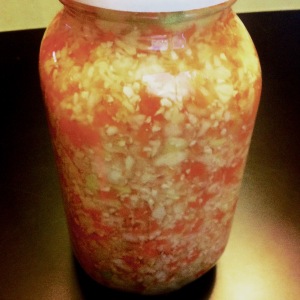Do you ever feel a bit “overextended” in the belly after a meal or a little “gassy?” Are you tired of carrying your “food baby?”
Well, bloating is common. Up to 25-30% of people experience it regularly (that’s 1 in 3)! It happens when you have trouble digesting. The symptoms come from excess gas, reactions to foods, or food not moving through you as well as it could.
There are many reasons you might experience these symptoms. Maybe because of a serious condition (disease), or a food allergy or intolerance. It can also result from how you eat. If you have a serious digestive issue like IBS (Irritable Bowel Syndrome), then make sure you eat accordingly. Same goes if you know certain foods give you gas. Simply avoid them.
If you’re already doing those things, and still experience bloating, here are some great tips for dealing with it naturally.
1 – Don’t overeat
If you overeat at a meal, then you’ll feel bigger around the mid-section. You’ll feel more pressure in your abdomen. Plus, you’re forcing your digestive system to work overtime (and you’d be grumpy too if you were forced to take on all that extra work!). It’s better to eat until you feel almost full and not overindulge. Grab an extra snack or small meal throughout the day if you have to. Just don’t over-stuff yourself in one sitting.
2 – Avoid sugar alcohols
Sugar alcohols are low-calorie sweeteners made from sugars. In an ingredients list, they end in “-ol,” and include things like sorbitol, xylitol, and erythritol. They’re found in some chewing gums and sugar-free foods. Some people experience bloating after eating foods with these. So, try avoiding them and see if that helps you.
3 – Avoid swallowing air
Seems like a no-brainer right? Think of a baby gulping on the breast or at the bottle…for sure, you’re gonna end up with a gassy baby. Same is true of adults, and things like carbonated drinks are the biggest culprit here. You can also swallow air when you chew gum or drink through a straw, so try ditching these.
You can also swallow air when eating too quickly or while talking. Which leads me to…
4 – Eat slower, more mindfully, and less stressed
Eating too fast isn’t doing your digestive system any favours. You can help the food move along by chewing it thoroughly and s-l-o-w-i-n-g down your eating habits. Be mindful and enjoy the time you are spending eating your meals. Savour them.
The feeling of stress can also cause increased bloating. Stress-reducing techniques can help improve your digestion. Try meditating or deep breathing (but not while you’re eating). 🙂
5 – Try peppermint
Peppermint oil has been shown to improve bloating. It’s thought to increase transit time by relaxing the stomach muscles and increasing the flow of bile. Try diluting peppermint oil in water (ensuring it is certified therapeutic grade), steeping fresh peppermint leaves, or a peppermint tea bag, and drinking it slowly. See if that helps reduce your symptoms.
6 – Take Digestive Enzyme Supplements
There are certain over-the-counter products that can be useful. This includes supplemental enzymes that can help break down indigestible carbohydrates. Have you heard of or tried Beano? It contains the enzyme alpha-galactosidase, which can help break down indigestible carbohydrates from various foods. And for many people these types of supplements can provide almost immediate relief.
7 – Take Probiotics
Gas produced by the bacteria in the intestine is a major contributor to bloating. And we know that including probiotics as part of your daily routine can help to populate the good bacteria and also have a positive impact on digestion and immune health. It would reason then, that including a probiotic in your diet will help to reduce gas production and bloating. They can take a while to start working though, so be patient.
As you can see, there are a bunch of natural ways to deal with bloating.
First, avoid it by not eating things that you know give you gas or aggravate a known digestive issue. Try not to overeat, consume sugar alcohols, or swallow air. Also, eating more mindfully and reducing stress can help too. Finally, if you are experiencing bloating, enjoy a cup of peppermint tea.
If you try all of these suggestions, and still experience bloating, then you may have a food intolerance/sensitivity or allergy. If you have a major concern, then please see your doctor. They can help to rule out a serious and/or chronic condition.
Recipe (peppermint): Peppermint Mocha Creamer

Ingredients:
- 1 can coconut milk
- ½ cup almond milk, unsweetened
- 2 tbsp cacao powder, unsweetened
- ½ tsp peppermint extract or 2 drops peppermint essential oil (certified therapeutic, food grade and safe for internal use)
- 3 tbsp honey or maple syrup (optional)
Directions:
- Place all ingredients in a blender and blend until well combined.
- Store in a sealed container in your fridge.
- You can pour into your morning coffee & enjoy or you can enjoy it on it’s own. Either way, you’ll be in heaven!



